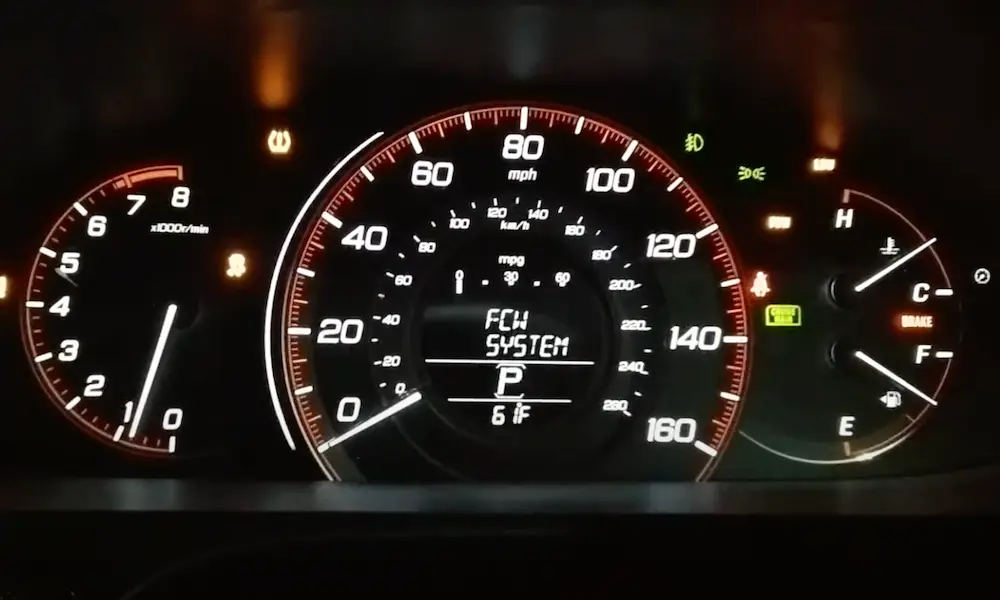When your Dodge Ram’s dashboard lights up like a Christmas tree with ABS, traction control, and ESC warnings, there’s a good chance your wheel speed sensors are the culprits. These small but critical components affect everything from your braking system to 4WD functionality. Let’s dig into what goes wrong with these sensors, how to diagnose the issues, and what you can do to fix them.
What Wheel Speed Sensors Do in Your Dodge Ram
Wheel speed sensors aren’t just for show – they’re the eyes and ears of your Ram’s safety systems. These magnetic devices monitor how fast each wheel is turning and send that data to your truck’s computer systems.
Your Dodge Ram uses this information to control:
- Anti-lock braking system (ABS)
- Electronic stability control (ESC)
- Traction control
- 4WD engagement
- Cruise control functionality
- Accurate speedometer readings
When these sensors fail, it’s not just one feature that stops working – it’s an entire cascade of systems.
Warning Signs of Wheel Speed Sensor Failure
Your truck will definitely let you know when the wheel speed sensors aren’t happy. Here are the telltale signs to watch for:
Dashboard Warning Lights
The most obvious indicator is multiple warning lights illuminating simultaneously:
- ABS light
- Traction Control light
- “Service ESC” warning
- “4WD Not Available” message
- “Ready-Alert Braking Not Available” notification
According to multiple customer reports, these warnings often appear together rather than individually.
Performance Problems
Beyond the lights, you’ll notice real-world effects on your truck’s behavior:
- Disabled cruise control
- 4WD system that won’t engage
- Erratic or non-functional speedometer
- Unusual brake pedal feel or reduced braking performance
- Traction control that no longer activates on slippery surfaces
In severe cases, your Ram might even limit engine power as a protective measure.
Common Causes of Wheel Speed Sensor Problems
Dodge Ram wheel speed sensor failures typically stem from several specific issues. Let’s examine the most frequent culprits:
Wiring Harness Defects (30-40% of Cases)
Surprisingly, the sensor itself isn’t always the problem. Diagnostic data shows that about 40% of wheel speed sensor complaints trace back to wiring harness issues:
- Chafed Wires: Harnesses that rub against brake lines or the propeller shaft lose insulation and short circuit.
- Broken Conductors: Wires frequently break within 2 inches of connectors due to repeated flexing.
- Loose Terminals: Pin retainers in weatherpack connectors fail, creating intermittent connections.
These wiring issues are especially common on the front left sensor in 2017-2019 HD Rams, as documented in Technical Service Bulletin 05-005-17.
Corrosion and Water Damage (20-25% of Cases)
Environmental factors take a heavy toll on wheel speed sensors:
- Connector Oxidation: Moisture creates resistance imbalances at connection points.
- Sensor Corrosion: Water intrusion damages the internal components.
- Salt Exposure: Winter road salt accelerates corrosion, with coastal regions showing a 22% higher failure rate within three years.
FCA has issued multiple technical service bulletins addressing oxidation problems, particularly in high-humidity regions.
Physical Damage and Contamination
The sensitive magnetic components can be compromised by:
- Metal Debris: Shavings from worn wheel bearings interfere with magnetic readings.
- Reluctor Ring Damage: The toothed rings that the sensors read can crack or become contaminated.
- Improper Gaps: If the sensor isn’t positioned correctly relative to the reluctor ring, readings become erratic.
The 2025 Ram 1500 was even recalled for damaged encoder rings due to improper handling during assembly.
Control Module Software Errors (15-20% of Cases)
Sometimes the problem is digital rather than physical:
- ABS Module Bugs: Software flaws cause the system to misinterpret valid sensor data as faulty.
- Signal Processing Errors: Algorithms sometimes flag normal variations as sensor failures.
In late 2024, Stellantis recalled over 1.2 million 2019-2024 Ram 1500 trucks for software issues in the ABS control module that falsely triggered stability control warnings.
Diagnostic Trouble Codes You Might See
When you scan your Ram’s computer system, these are the common DTCs (Diagnostic Trouble Codes) associated with wheel speed sensor problems:
| Code | Description | Likely Cause |
|---|---|---|
| C003A-1D | Right rear wheel speed sensor circuit out of range | Wiring issue or sensor failure |
| C1011 | Left front wheel speed sensor erratic performance | Contamination or reluctor ring damage |
| C0031-2F | Wheel speed sensor circuit failure | Chafing harness near brake lines |
| C0049-7B | Brake fluid level sensor conflicts | Related hydraulic system issue |
| C0031-62 | Signal compare failure | Deformed encoder ring |
These codes provide valuable clues about which wheel is affected and what type of failure is occurring.
How to Diagnose Wheel Speed Sensor Issues
Before replacing parts, perform these targeted diagnostic steps:
Resistance Testing
- Disconnect the sensor connector
- Use a multimeter to check resistance across the sensor terminals
- Normal reading should be between 1,600-2,300 ohms
- Readings outside 980-2,350 ohms indicate a faulty sensor
This diagnostic approach helps determine if the sensor itself is bad.
Visual Inspection
- Examine the sensor and connector for signs of corrosion, damage, or water intrusion
- Check the wiring harness for chafing, particularly at routing points near brake lines
- Inspect the reluctor ring (if visible) for damage or debris
- Look for broken wires within 5cm of connectors
Dynamic Testing
A more advanced test requires:
- Connect a voltmeter to the sensor circuit while the connector is still attached
- Spin the wheel slowly (about 0.5 Hz)
- A healthy sensor produces AC voltage above 200mV
- Lower readings suggest a failing sensor or excessive air gap
Wiring Continuity Check
Test the integrity of the wiring harness by:
- Disconnecting both ends of the sensor wiring harness
- Using a multimeter to check for continuity between harness ends
- Verifying isolation (>1 MΩ) between each wire and chassis ground
How to Fix Wheel Speed Sensor Problems
Once you’ve diagnosed the issue, here are the appropriate fixes:
Sensor Replacement
If the sensor itself is faulty:
- Purchase the correct sensor for your specific Ram model and year
- Remove the wheel to access the sensor (typically mounted on the steering knuckle or axle housing)
- Disconnect the electrical connector
- Remove the mounting bolt (may require penetrating oil if corroded)
- Install the new sensor with a thin coat of anti-seize on the mounting area
- Reconnect the electrical connector and route the wiring properly
- Reinstall the wheel
Wiring Harness Repair or Replacement
For harness issues:
- Purchase a replacement harness if available
- If repairing, solder damaged connections rather than using crimp connectors
- Protect repaired sections with heat-shrink tubing and electrical tape
- Secure the harness with zip ties to prevent future chafing
- Follow proper routing paths according to service guidelines
Ram issued Technical Service Bulletin 05-005-17 with specific rerouting instructions for certain models.
Control Module Updates
For software-related issues:
- Check if your Ram is covered under Recall 24V-653 for ABS module issues
- Visit your dealer for software updates if applicable
- After repairs, have the entire ABS system scanned to ensure all modules are communicating properly
Connector Treatment for Corrosion
If corrosion is the culprit:
- Disconnect and clean connectors with electronic contact cleaner
- Apply dielectric grease to prevent future oxidation
- Consider using a product like Fluid Film on exposed sensor areas for added protection
Preventing Future Wheel Speed Sensor Failures
Proactive maintenance can help extend the life of your Ram’s wheel speed sensors:
- Regular Underbody Cleaning: Wash away salt and road grime, especially in winter months
- Inspect Wiring During Routine Service: Look for early signs of harness wear
- Apply Dielectric Grease: When servicing brakes or wheels, add grease to sensor connections
- Keep Software Updated: Ensure your Ram has the latest control module software
- Address Bearing Issues Promptly: Failing wheel bearings can damage sensors and reluctor rings
When to Replace vs. When to Repair
Making the right decision can save you money and time:
Consider Sensor Replacement When:
- Resistance readings are outside the normal range
- The sensor body shows physical damage
- You’ve verified the wiring is good but symptoms persist
Consider Wiring Repair When:
- Multiple sensors are showing similar issues
- The problem is intermittent
- Visual inspection reveals harness damage
Consider Control Module Solutions When:
- All sensors are reporting problems simultaneously
- The issue began after a software update or battery disconnect
- Your Ram is covered under a relevant recall
The Cost Factor
Wheel speed sensor repairs vary significantly in price:
| Repair Type | DIY Cost | Professional Repair Cost |
|---|---|---|
| Single Sensor Replacement | $40-80 for parts | $150-300 including labor |
| Wiring Harness Repair | $15-30 for materials | $200-400 including labor |
| Complete Harness Replacement | $120-250 for parts | $350-600 including labor |
| ABS Module Update | Not typically DIY | $100-200 at dealership |
Remember that costs can be higher for 4WD models and newer Rams with more complex systems.
Real-World Impact of Sensor Failures
The consequences of ignoring wheel speed sensor problems go beyond warning lights:
- Safety Risk: Without ABS, your stopping distance increases dramatically on wet or slippery roads
- 4WD Functionality: Approximately 85% of sensor failure cases result in disabled 4WD systems
- Towing Concerns: Trailer Sway Control deactivates with rear sensor failures, increasing trailer accident risk
- Hill Assist Issues: Failed sensors disable Hill Start Assist, creating a 37% higher rollaway risk when parking on inclines
Prompt attention to these issues isn’t just about convenience—it’s about maintaining your Ram’s core functionality and safety features.
Dodge Ram Models Most Affected
While all Rams can experience wheel speed sensor problems, certain model years and configurations show higher failure rates:
- 2017-2019 Ram 2500/3500: Front left sensor wiring routing issues
- 2019-2024 Ram 1500: Control module software problems affecting sensor interpretation
- 2025 Ram 1500: Encoder ring manufacturing defects
- Trucks used in coastal regions: Higher corrosion-related failures
If you own one of these models, being proactive about inspection could save you trouble down the road.
By understanding the common causes of Dodge Ram wheel speed sensor problems and following proper diagnostic protocols, you can effectively address these issues before they compromise your truck’s safety systems or leave you stranded.














